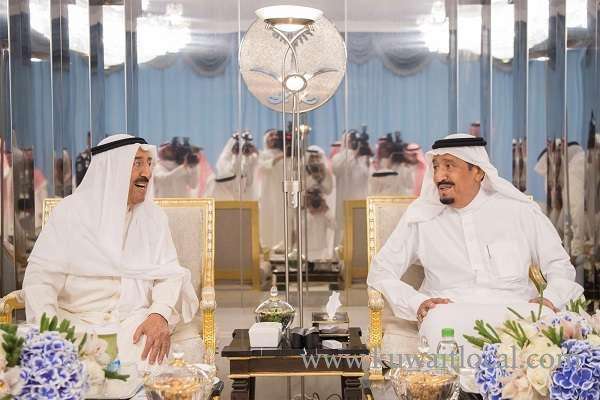Latest News
- Kuwait-Jordan Durra Field Joint Statement Rejected By Iran
- GTD Cracks Down On Vehicle Noise Pollution In Sulaibiya
- Mystery Of Dead Fish At Shuwaikh Beach Sparks Urgent Action
- MEW To Complete Links With The Interior And Justice Ministries B...
- 8 Expats Jailed For Bribing An Officer To Obtain Driver's Licens...
- Weekend Weather Is Expected To Be Hot
- From Tomorrow, Traffic Diversion On Third Ring Road
- Ministry Of Health Refute Rumors On Non-availability Of Antibiot...
- Amir Of Kuwait And Jordan King Renew Commitment To Regional Secu...
- 37 Arrested With Narcotics And Firearms
- Outrage Over Candidate's Arrest
- Six Stores Shut Down In Jahra For Selling Fake Goods
Amir Saddened By Regional Dispute, Expresses Commitment To Mediation

His Highness the Amir Sheikh Sabah Al Ahmad Al Jaber Al Sabah has expressed his deep sorrow and extreme concern over the ongoing dispute and subsequent rift in relations between Qatar and its Gulf Cooperation Council (GCC) neighbors, Bahrain, Saudi Arabia and the UAE, as well as Egypt.
Nevertheless, His Highness the Amir said that he was determined to carry on with his mediation efforts. “We will not give up our historical responsibilities and we will remain committed to them until the negative developments are over and our skies are clear again,” said the Amir, following the latest round of mediation talks last week. He added that the support he continues to receive from all sides has eased the pain of developments and increased his determination to address them and to ensure that the progress and achievements made by the GCC should continue.
Last week, US Secretary of State Rex Tillerson held talks in Jeddah with ministers from Saudi Arabia, Bahrain, Egypt and the UAE, as well as Kuwait, which is mediating in the dispute, on how to end their month-long rift with Qatar, but without any immediate breakthrough in the gridlock.
Bahrain, Egypt, Saudi Arabia and the UAE severed diplomatic relations with Qatar on 5 June, accusing it of financing extremist groups and aligning with Iran, the Gulf Arab states' arch rival in the region. The four also imposed various economic sanctions and submitted over a dozen demands that Qatar had to comply with before sanctions could be removed, including curbing Qatar’s relations with Iran, closing the Al Jazeera TV channel, shutting a Turkish military base in Qatar and handing over all people designated as ‘terrorists’ who had sought sanctuary in Qatar.
Clarifying the issue, the UAE State Minister for Foreign Affairs Anwar Gargash said that there can be no permanent solution without addressing three fundamental issues. “The Qatar crisis is about the absence of trust; extremism and terrorism; and undermining regional stability. Ny solution must address all of the above,” he noted, adding, “A temporary solution is not a wise one.”
;Piling additional pressure on Qatar, Cable News Network (CNN) published last week a previously secret accord between Riyadh and Doha that clearly shows Qatar as having broken signed pledges made in 2013 and 2014, not to interfere in the affairs of Gulf countries and Egypt.
The handwritten Riyadh Agreement signed in November 2013 by King Abdullah Bin Abdul Aziz Al Saud of Saudi Arabia, His Highness Sheikh Sabah Al Ahmad Al Jaber Al Sabah of Kuwait, and His Highness Shaikh Tamim Bin Hamad Bin Khalifa Al Thani of Qatar, lays out the signatories’ commitments to avoid any interference in the internal affairs of other Gulf nations, including barring financial or political support to ‘deviant’ groups.
The agreement specifically mentions not supporting the Muslim Brotherhood as well as not backing opposition groups in Yemen that could threaten neighboring countries. The countries also vowed not to support antagonistic media.
In a supplementary Riyadh Agreement signed in November 2014, in the presence of the signatories to the 2013 Riyadh Agreement, as well as His Majesty King Hamad Bin Eisa Al Khalifa of Bahrain, His Highness Shaikh Mohammad Bin Rashid Al Maktoum, Vice-President and Prime Minister of the UAE and Ruler of Dubai and His Highness Shaikh Mohammad Bin Zayed Al Nahyan, Crown Prince of Abu Dhabi and Deputy Supreme Commander of the UAE Armed Forces, the signatories mention their commitment to support Egypt’s stability, including preventing Al Jazeera from being used as a platform for groups or figures challenging the Egyptian government.
Trending News
-
 Kuwait Implements Home Biometrics Services Ahead O...
14 April 2024
Kuwait Implements Home Biometrics Services Ahead O...
14 April 2024 -
 Kuwait Airways Provides Update On Flight Schedule...
14 April 2024
Kuwait Airways Provides Update On Flight Schedule...
14 April 2024 -
 Kuwait Airways Introduces Convenient Home Luggage...
15 April 2024
Kuwait Airways Introduces Convenient Home Luggage...
15 April 2024 -
 Expat Residency Law Amended By Kuwait Ministerial...
20 April 2024
Expat Residency Law Amended By Kuwait Ministerial...
20 April 2024 -
 Two Expats Are Arrested For Stealing From Salmiya...
17 April 2024
Two Expats Are Arrested For Stealing From Salmiya...
17 April 2024 -
 Kuwait Airways Resumes Flights To Beirut And Oman...
15 April 2024
Kuwait Airways Resumes Flights To Beirut And Oman...
15 April 2024 -
 Temperature Increases Cause Electricity Load Index...
21 April 2024
Temperature Increases Cause Electricity Load Index...
21 April 2024 -
 Thief Returns Stolen Money With An Apology Letter...
15 April 2024
Thief Returns Stolen Money With An Apology Letter...
15 April 2024 -
 3 Expats Caught In Salmiya With 213 Bottles Of Loc...
23 April 2024
3 Expats Caught In Salmiya With 213 Bottles Of Loc...
23 April 2024 -
 Ministry Of Interior Denies Social Media Rumors Re...
13 April 2024
Ministry Of Interior Denies Social Media Rumors Re...
13 April 2024












Comments Post Comment